Vision impairment is one of the most common causes of disability in the United States. More than 12 million Americans aged 40 and older are visually impaired or blind and the number is projected to double by 2050. Women are disproportionately affected by some of the most common eye diseases. Eye conditions can also present or affect women differently across the lifespan. Some are linked to specific events like pregnancy and menopause, while others become increasingly common and burdensome with age.
Disparities in eye diseases due to biology widen even further when considering factors such as social determinants of health; gaps in research data, literature, and policy; insufficient provider and patient education; and limitations in screening and treatment options. These sex and gender disparities are clinically under-addressed and burdensome on both patient quality of life and the health care and economic systems.
In December 2021, SWHR convened a diverse and interdisciplinary working group of clinical and public health researchers, health care providers, patients/patient advocates, and policy leaders for a closed, one-day roundtable meeting. The group discussed the health, social, and economic impacts of eye diseases that disproportionately affect women’s health.
SWHR’s Eye Health Program published the SWHR Patient Toolkit: A Guide to Women’s Eye Health in January 2022 to empower individuals to navigate their eye health and eye care as they age.


